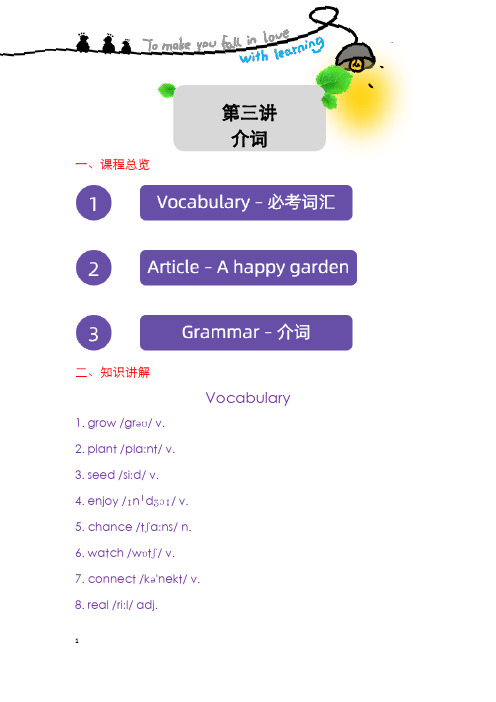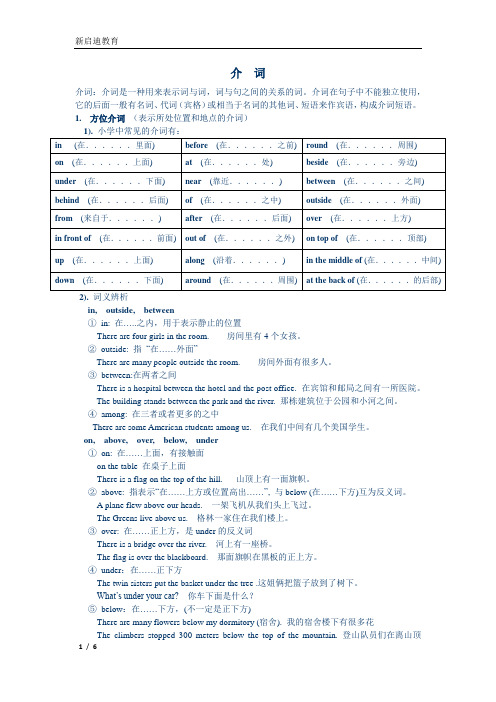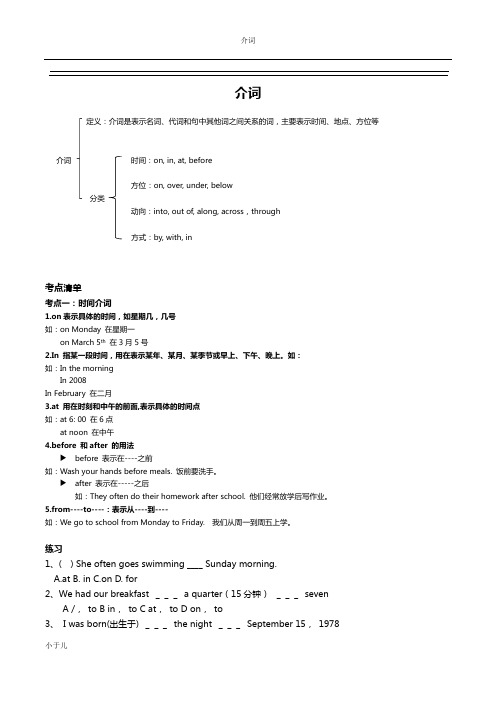介词讲义完整版
- 格式:docx
- 大小:23.89 KB
- 文档页数:8

,介词的分类1. 简单介词,是指单个的介词女口:in, on, at, on, to, with 等2. 合成介词,是指两个简单介词合在一起构成的介词如:in to, on to, without, i nside3. 短语介词,是指一个或两个简单介词与一个或几个其他词类的词组合,在意义和作用上相当于一个简单介词的短语如:in stead of 代替because of 因为accord ing to 按照二,表示时间的介词in front of在…的前面1. at表示具体的时间点女口:at eight o'clock联想:at构成的固定短语:at first 首先at least 至少at prese nt 目前at noon在中午at the age of在…岁时at the same time同时at the end of在。
末at the mome nt在目前,现在at school在上学女口: _________________________________________________ In some wester n coun tries shops are closed _____________________________ w eeke nds.2. in用于年,月,季节,上午,下午,晚上等。
in March在三月in spri ng在春天in 2008 在2008 年in the morni ng/afterno on /eve ning注意:in表示在某一季节或某一月份时,一般不加冠词,但季节和月份的意义一旦具体化,就要加定冠词the。
女口:The weather is a little in May.An earthquake happe ned in Sichua n in the May of 2008.In summer childre n are happy because they can swim.联想:in构成的固定短语:show great interest in 对。

第三讲介词一、课程总览二、知识讲解Vocabulary1. grow /grəʊ/ v.2. plant /plɑːnt/ v.3. seed /siːd/ v.4. enjoy /ɪnˈdʒɔɪ/ v.5. chance /tʃɑːns/ n.6. watch /wɒtʃ/ v.7. connect /kə'nekt/ v.8. real /riːl/ adj.grow /grəʊ/ 植物生长v. If a plant grows in a particular place, it exists and develops there.翻译:这些花今年长得最好。
__________________________________________答案:These flowers grow best this year.plant /plɑːnt/ 种植;栽种v. to put plants or seeds in the ground to grow.翻译:我们每年在花园里种西红柿和胡萝卜。
______________________________________________答案:We plant tomatoes and carrots in the garden every year.seed /siːd/ 种子n. a small hard object produced by plants, from which a new plant of the same kind grows.翻译:农民在春天播种。
_____________________________________________答案:Farmers plant seeds in spring.enjoy /ɪnˈdʒɔɪ/ 享受……的乐趣;喜欢v. to get pleasure from something.翻译:我真的很喜欢那部电影。

介词介词:介词是一种用来表示词与词,词与句之间的关系的词。
介词在句子中不能独立使用,它的后面一般有名词、代词(宾格)或相当于名词的其他词、短语来作宾语,构成介词短语。
1.方位介词(表示所处位置和地点的介词)2). 词义辨析in, outside, between①in: 在…..之内,用于表示静止的位置There are four girls in the room. 房间里有4个女孩。
②outside: 指“在……外面”There are many people outside the room. 房间外面有很多人。
③between:在两者之间There is a hospital between the hotel and the post office. 在宾馆和邮局之间有一所医院。
The building stands between the park and the river. 那栋建筑位于公园和小河之间。
④among: 在三者或者更多的之中There are some American students among us. 在我们中间有几个美国学生。
on, above, over, below, under①on: 在……上面,有接触面on the table 在桌子上面There is a flag on the top of the hill. 山顶上有一面旗帜。
②above: 指表示“在……上方或位置高出……”, 与below (在……下方)互为反义词。
A plane flew above our heads. 一架飞机从我们头上飞过。
The Greens live above us. 格林一家住在我们楼上。
③over: 在……正上方,是under的反义词There is a bridge over the river. 河上有一座桥。
The flag is over the blackboard. 那面旗帜在黑板的正上方。

初中英语专题复习——介词一、介词概念介词是一种虚词,它在句中的作用非常重要。
它用来表明名词与句中其他词的关系,但是介词不能单独使用。
常考点包括一些固定搭配和一些近义词。
固定搭配如:on one's way home,help…with,send for,be interested in…,be late for,be angry with,be good at等。
for表示多长时间。
since后接时间起点,其终点往往为现在,常与:这两个介词都可以表示时间"在以后"的意思。
其区别是:after 以;in 以现在为起点,表示将来一段时间以后,常用于将来时态的句子。
by表示"以…的方式,方法,手段" 和"乘某种交通工具";with";in 表示"以……方式,用语言,文字等媒介"。
It's impossible for me to watch TV after eleven o'clock.It's kind of you to help me.之前的形容词用于描写事物的特点,如可能性,必然性,难易程度等。
二、介词具体点拨(一) 知识概要介词在英语中用法很活,也无一定规律可循。
在初中范围内应学一个记住一个,特别是那些和动词的特殊搭配。
下面是一般的规律,可帮助学习时参考介词表示时间,表示地点,方位,表示原因方式,其他。
①about 大约在……时间 如:about five o'clock 在周围②about 大约多远如:about five kilometers③about 关于、涉及如:talk about you④above 高出某一平面如:above sea level如:walk across the street在……之后 如:after supper……后面如:one after another ③追赶如:run after you背靠,逆风如:against the wall,against the windbe against you如:among the trees在某时刻 如:at ten ②在小地点如:at the school gate如:at high speed ④向着,对着如:at me①在……之前 如:before lunch……之前 如:sit before me①位于……之后 如:behind the tree①低于……水平 如:below zero如:below the standard①到……时刻,在……时刻之前如:by five o'clock紧挨着如:site by site③乘坐交通工具如: by air在……期间如:during the holidays①延续多长时间 如:for five years……去如:leave for Shanghai③为了,对于如:be good for you①从某时到……某时 如:from morning till night如:from New York③由某原料制成如:be made from⑤来自何处 如:where are you from①在年、月、周较长时间内 如:in a week②在里面如:in the room用某种语言 如:in English ④穿着如:in red①进入……里面如:walk into②除,分 如:divide into ③变动 如:turn into water①接近某时 如:near five years ②在……附近 如:near the park①用某种原料制成 如:be made of②属于……性质 如:a map of U. S .A①某日、某日的上下午如:on Sunday afternoon②在……上面 如:on the desk ③靠吃……为生如:live on rice③关于 如:a book on Maths①渡过一整段时间 如:work over night②在上方如:over the desk③超过,高于 如:over five pairs①超过某一时刻 如:ten past five②经过某地 如:walk past the park①从某时以来 如:since 1980 ②原因 如:Since you were ill①经过某一时期 如:through his life②通过、穿过某地 如:through the forest①直到某时为止 如:till five o'clock①差多少时间 如:five to ten ②问,到,去往 如:to Shanghai ③面对面 如:face to face ④给予如:give a book to me①在……下面 如:under the desk ②少于 如:under ten在……管制之下如:under the rule①用某种工具 如:with a pen ②带着,具有如:with me没有 如:without air(二) 正误辨析[误]We got to the top of the mountain in daybreak.[正]We got to the top of the mountain at day break.[析]at用于具体时刻之前,[误]Don't sleep at daytime[正]Don't sleep in daytime.[析]in 要用于较长的一段时间之内,或或[正]We visited the old man on Sunday afternoon.[析]in the morning,前面的介词都要改为on,[误][正]He became a writter in his twenties[析]这句话应译为:他在20[误]He went to New York to find a job in sixteen years old.[正]He went to New York to find a job at sixteen.[析]在具体年岁前用at,等等。

介词一、含义介词属于虚词,不能单独在句子中充当成分,必须与其他词类或者成分结合构成介词短语在句中使用。
二、分类1、简单介词(只是一个单词)2、合成介词3、介词短语4、分词介词三、用法I时间介词1、常见时间介词:at,in,onat①一天中的某个时间点(sunrise,sunset,daybreak,dawn,noon,night,nightfall,midnight等)②节日(期间)③进餐时间(breakfast,lunch,supper)④钟点或某一时刻⑤固定搭配at the beginning/end of,at the age of,at the sight of/at firstsight,at the glance等in①世纪(in the 1980s在20世纪80年代)②年、月、日③季节④早上、下午、晚上(morning,afternoon,evening)on①特定的某一天;具体到某一天的上午、下午、晚上等②节日(节日当天)③如果morning,afternoon,evening,night前有early/lately修饰,或者这些词前有具体钟点,用介词inEg:At five o’clock in the morning,I reached the station.by,until/tillby在......之前;不迟于,通常与非延续性动词、过去完成时连用(强调动作在某个时间点前结束)until/till用法参照until(正式用语,用于句首表强调)/till(口语中常用,通常不用于句首,不用于强调句)【conj.】引导时间状语从句(动作持续到某个时间点)since,forsince常用于现在完成时中,表示情况持续至说话时刻或者动作开始于某个时候since+时间点forfor+一段时间,常与延续性动词连用,表示动作延续或者持续的时间(也可用于回答how long)fromfrom...to...表示开始的时间before,afterbeforebefore+时间点afterafter+时间点(将来时)after+时间段(过去时)注意:根据语言环境判断时态,灵活应用2、加时间段的介词in+一段时间过......后(谓动为短暂性动词);在......之内(谓动为延续性动词)【一般将来/过去将来】(可用来回答how soon)for(同上)during在......期间(强调自始至终)through自始至终;从头到尾II地点介词in,on,toAin 在地区之内,属于该范围(B 在A 内)on 两地相邻、接壤(A 和C )to 在地区之外的某方位,不属于该范围(C 和D )in front of ,in the front of in the front of 在......的前部(范围内)如图Ain front of 在......之前(范围外)如图Bby ,near ,besideby 在......旁边(比near 近)near 在附近,在旁边Eg :She lives by the river.(她住在河边。

介词一,介词得分类1.简单介词,就是指单个得介词如:in, on, at, on, to, with等2.合成介词,就是指两个简单介词合在一起构成得介词如:into, onto, without, inside3.短语介词,就是指一个或两个简单介词与一个或几个其她词类得词组合,在意义与作用上相当于一个简单介词得短语如:instead of 代替because of因为according to按照in front of 在、、、得前面二,表示时间得介词1.at表示具体得时间点如:at eight o’clock联想:at构成得固定短语:at first首先at least至少at present目前at noon在中午at the age of在、、、岁时at the moment在目前,现在at the same time同时at school 在上学at the end of在。
末如:In some western countries shops are closed___________ weekends、2.in用于年,月,季节,上午,下午,晚上等。
in March在三月in spring在春天in 2008在2008年in the morning/afternoon/evening注意:in表示在某一季节或某一月份时,一般不加冠词,但季节与月份得意义一旦具体化,就要加定冠词the。
如:The weather is a little in May、An earthquake happened in Sichuan in the May of 2008、In summer children are happy because they can swim、联想:in构成得固定短语:hand in上交in fact事实上in surprise吃惊地in search of寻找in public当众in the end最后,终于in no time立刻,马上in a minute立刻,马上in front of在、、、前面in a word一句话,总而言之in good health身体健康得do well in在、、、方面干得不错be interested in对、、、感兴趣in common共同得show great interest in对。

介词一、介词的分类:时间介词地点介词方式介词二、知识点精讲:1.表示地点位置的介词1)at ,in, on, to:in表“范围较大的地方”,强调“空间”;at表在“范围较小的地方”,强调“点”;on 表“在物体的表面”in:(1)表示在大地方; He arrives ____ Nanjing . (2)表示“在…范围之内” He lives____ the bedroomat: (1)表示在小地方; He arrives ____ home (2)表示“在……附近,旁边” He sat ____the table表示方位:in:表“在…范围之内” on: 表毗邻,接壤,。
t o: 表示在……范围外,不强调是否接壤;或“到……”Hunan lies ___the south of Hubei. Taiwan lies ___the east of China. China lies _____the west of America.表位置:in “在……内”,on “在……上”(接触表面),on “在两边”“在左/右边”。
They are putting up a picture_________thewall.The girl ______the right is a famous actress.1)____ the tree 用于指树上的鸟、人等。
___ the tree用于指生长在树上果实。
2)____ the wall镶嵌在墙内,窗户、门等。
____ the wall在墙的表面之上,地图等。
在报纸上____ the newspaper报上的内容。
____ the newspaper放在报纸上的东西3).There is a big hole ____ the wall. 4).The teacher put up a picture ____ the wall.2)by, beside, near和next to/close to1) by和beside均表示“在……旁边”,常可换用There is a chair ____ the table. 桌子边上有一把椅子。

高三英语语法介词讲义介词是英语中最活跃的词类之一,它表示的是它后面的名词或代词(或相当于名词的其他词类、短语或从句) 与其他句子成分的关系。
一、介词的分类介词可分为下列三类:1. 简单介词:about, above, across, after, against, among, at, before, behind, below, beneath, beside, besides, beyond, but, by, down, during, except, for, from, in, like, near, of, off, on, over, past, round, since, through, to, towards, under, until, till, up, with等2. 合成介词:inside, into, onto, outside, throughout, upon, within, without等3. 短语介词:according to, ahead of, along with, apart from, as for, as to, because of, by means of, in front of, in spite of, instead of, on account of, on behalf of , owing to, due to, together with, up to, in/with regard to, next to等介词不能单独充当句子成分,它必须与名词、代词或相当于名词作用的成分(动名词、名词性从句、疑问词+不定式)构成介词短语才能充当句子的成分。
It’s going to be sunny tomorrow according to the weather forecast.How much money need I take with me?She is fond of collecting stamps.I wonder how we can finish the job in time.He gave us some advice on how to learn English.二、介词短语的句法功能1. 作定语,例如:I have lost the key to the door of my room.我把房间的钥匙丢了。

介词讲义介词是一种虚词,用来表示名词或相当于名词的其它词语句中其它词的关系,不能单独使用。
介词可与名词或相当于名词的其它词构成介词短语。
当介词后直接跟动词时,动词用—ing形式。
II表示时间的介词(1) at,on,in1)at:用于表示时刻、时间的某一点at noon正午时at night在夜间at present目前at nine在九点钟2)on:用于某天,某一天的上、下午(指具体的某一天时,一律用on)注意:泛指一般的上午(下午)时用in,但特指某日的上午(下午)时用on。
in the morning在早上on sunday morning在周日早上on Monday在周一on Tuesday morning在周二早上on May 4,1996在1996年5月4日on a cold night在一个寒冷的夜晚on the night of July(the) first在七月一日的夜晚3)in:用于表示一段时间,用于年、月、世纪、四季或泛指的一天的上午、下午或晚上等名词前,还可用于表示“从现在起,多长时间之后”如:in three days.注意:在this,last,next,every等词前面不能再加介词。
this morning今天上午last Friday 上周五next Sunday下周日in the week在这周in May在五月in spring在春季in 1995在1995年in September,1995在1995年9月in the morning在上午in the afternoon在下午in the evening在晚上(2)in,after1) in:过……后(未来时间) in是以现在为基准,in an hour是指从现在起1小时之后,所以一般只用于将来时。
用how soon 或when 提问。
in an hour 一小时之后in a week or so 一个多星期之后He will be back in five hours.他五小时之后回来。



介词定义:介词是表示名词、代词和句中其他词之间关系的词,主要表示时间、地点、方位等介词时间:on, in, at, before方位:on, over, under, below分类动向:into, out of, along, across,through方式:by, with, in考点清单考点一:时间介词1.on表示具体的时间,如星期几,几号如:on Monday 在星期一on March 5th在3月5号2.In 指某一段时间,用在表示某年、某月、某季节或早上、下午、晚上。
如:如:In the morningIn 2008In February 在二月3.at 用在时刻和中午的前面,表示具体的时间点如:at 6: 00 在6点at noon 在中午4.before 和after 的用法◆before 表示在----之前如:Wash your hands before meals. 饭前要洗手。
◆after 表示在-----之后如:They often do their homework after school.他们经常放学后写作业。
5.from----to----:表示从----到----如:We go to school from Monday to Friday. 我们从周一到周五上学。
练习1、( ) She often goes swimming ____ Sunday morning.A.atB. inC.onD. for2、We had our breakfast ___a quarter(15分钟)___sevenA /,toB in,toC at,toD on,to3、I was born(出生于) ___the night ___September 15,1978A in,onB at ,onC at ,inD on ,of4、We traveled overnight to Paris and arrived _______ 5 o’clock ______ the morning.A. on; inB. at; inC. at; onD. in; on5. Do your homework (before/after) watching TV.6.Washing your hands (before/after) going to the bathroom.7. We have class Monday Friday.考点二:方位介词练习on over above in front of in the front of1.There is a tree the mountain.2. There is a bridge the river.2.There is a plane our head.3.The students sits the classroom.4.The tree stands the classroom.考点三:动向介词动向介词是指该介词出了具有方向性外,还伴随着动作,如through,into等。

介词(PREPOSITION)一、分类1.简单介词指由一个单词构成的介词,简单介词也可能由形容词、副词、名词、连词等转变而来,常用的有:by, in, after, on,at, past, since, till, until, over, opposite, off, near, of, with, up, under, toward (s), through, like, from, for, down, during, except, but, beyond, between, besides,beside, beneath, below,behind, before, among, along, against, above, across, about, amid (st), onto, underneath, unlike, around, round, next, despite,than,save除……之外。
He wrote by candlelight.他在烛光下写作。
She paused in admirationof the beautiful view.她驻足观赏美景。
The ground beneath us was a bank covered with grass.我们脚下是长着青草的河岸。
The wine can be drunk before, during and after a meal.这种酒在饭前、饭中及饭后饮用均可。
From behind her desk she heard them passing in the garden.她从书桌后听见他们从花园中走过。
The orchard is just up this road about a mile past the school on your left.果园就在这条路边,离左边的学校约有一英里远。


六年级初中英语介词讲义全一、选择题1.Xinjiang cotton is praised ________ the best cotton in the country ________ its high quality. A.for; as B.for; by C.as; for D.by; for 2.—When is your birthday?—My birthday is ________ August 21st.A.on B.at C.in D.for3.The rain is beating ________ the windows and Cindy is listening to the rain quietly. A.above B.across C.around D.against4.The ending of the film Diary of Dinosaurs was so surprising and fully went ________ my imagination.A.across B.over C.through D.beyond 5.Taking part in a social activity can help take your mind ________ matters that worry you and make you feel good about yourself.A.through B.across C.off D.into6.A study shows that rude languages spoken to children may have bad results that go ________ those of beating them.A.against B.beyond C.except D.with7.Last week, Oprah Winfrey had an interview ________ Harry and Meghan.A.with B.to C.about D.on 8.Sometimes I feel stressed because what my parents want me to do has gone ________ my ability.A.through B.against C.above D.beyond9.To fully understand the writer, we must read not only between the lines, but sometimes________ the lines.A.within B.beyond C.beside D.among10.On sunny days, my grandma often reads a novel ________ the window.A.for B.by C.with D.from11.—Do you really want to refuse this offer?—I have to. I’m afraid the job is ________ my ability.A.beyond B.beside C.behind D.between12.A new bridge the Yangtze River in Nanjing opened to traffic on Dec. 24, 2020. A.through B.over C.on D.along13.— Maybe you should call her up.—But I don’t want to talk with her ________ the phone.A.at B.in C.on D.with14.—It’s raining heavily outside. May I push my bicycle into your house?—Certainly. But please put it _________ the wall so that it won’t take up too much space.A.in B.on C.against D.over15.It is believed that ________ December 21, 1891, the first basketball game in history wasplayed.A.in B.on C.at D.for16.The blue planet is so far from the earth that radio signals, travel ________ the speed of light, take 16 hours to reach the spacecraft.A.for B.in C.on D.at17.—I can’t think of any other actress who is more beautiful than Audrey Hepburn.—You’ve got the point. Her beauty is ________ words and she succeeded ________ hard work. A.over; by B.over; throughC.beyond; by D.beyond; through18.________ Friday afternoon, our school ends earlier than usual.A.At B.On C.To D.In 19.Everyone was touched ________ words after they watched the film Hi, MOM 《你好,李焕英》directed by Jia Ling.A.under B.across C.beyond D.against 20.Don’t be afraid of difficulties. Remember: kites rise highest ________ the wind, not with it. A.against B.above C.across D.along21.Peter is clever enough to read and write __________ the age of 4.A.between B.at C.to D.during 22.Xuzhou Metro Line 2 came into use ________ November 28, 2020, it is one of the most important events in our daily life.A.at B.in C.on D.for 23.—Thanks for looking after me ________ my illness, Millie.—Don’t mention it. That’s what friends are for.A.through B.among C.with D.across 24.—Why can’t we drive in the emergency lane (应急车道) on expressway?—Because the lane makes it possible to race ________ the clock to save people’s lives. A.beyond B.over C.against D.through 25.—Thanks for looking after me ________ my illness, Millie.—Don’t mention it. That’s what friends are for.A.beyond B.through C.across D.with26.New York City, also known ________ Big Apple, becomes one of the world’s greatest business and cultural centers.A.as B.by C.for D.to27.The story The Ugly Duckling ________ Hans Christian Andersen has remained popular among children for centuries.A.in B.on C.by D.with28.The teacher encouraged the students to tell the story ________ English.A.at B.with C.in D.for29.The 20th China Jiangning Hengxi Watermelon Festival was held ________ May this year. A.at B.on C.in D.from30.If your temperature is_______37.3°, you should go to the doctor instead of going to school. A.above B.against C.under D.below31.—A serious study of physics is impossible ________ some knowledge of maths.—I couldn’t agree more. So we should also learn maths well.A.among B.between C.against D.without32.—It's reported that Stanley Ho Hung-sun passed away on May 26th at the age of 98.—The whole country felt sad about that. As a successful businessman, his contribution to society and love for the motherland went far ________ his wealth.A.beside B.over C.beyond D.above33.To our joy, Tom pleased everybody by making his dog walk ________ two legs.A.by B.over C.from D.on34.When are you arriving? I’ll pick you up the station.A.at B.to C.on D.off35.To my pleasure, my family is always ________me, so I can follow my dreams with great courage.A.past B.above C.upon D.behind 36.—There have been great changes in Taizhou in the past few years.—I can't agree more. The changes there are ________ my imagination.A.near B.past C.along D.beyond 37.Though there are so many things around us that go ______ our will, we can’t give up because following the dream is valuable.A.through B.towards C.against D.beyond38.My mum searched ________ the messy books and found my pencil was under a Harry Potter. A.as B.across C.through D.for39.—The boy is tall enough ________ his age.—Yes, I was much shorter when I was his age.A.of B.at C.from D.for40.________ a spring morning, a bird flew into our classroom and we were very excited to see it. A.In B.On C.At D.For【参考答案】一、选择题1.C解析:C【详解】句意:新疆棉因质量好被誉为全国最好的棉花。


第06讲介词目录01 考情透视.目标导航 (2)02 知识导图.思维引航 (3)03 考点突破.考法探究 (4)【基础详单】知识点1 介词概述、命题及解题方向 (4)知识点2 介词的句法功能 (4)考点一介词的基本用法知识点1 介词形式的分类 (5)知识点2 常用介词辨析 (6)知识点3 重难易错常考其它介词 (10)考点二介词和其它词类的搭配知识点1 介词和名词的搭配 (12)知识点2 介词和形容词的搭配 (14)知识点3 介词和其它词类的搭配 (15)04真题练习·命题洞现1.真题实战 (16)2.命题演练·······························································································································【基础详单】知识点1 介词概述介词是一种虚词。

介词一、介词的定义:介词一般位于名词或代词之前,在句中不单独做任何成分。
介词本身有独立的含义,但意义不够完整,在句中使用时,后面必须接有宾语构成介词短语后,才能表达完整的意义。
介词短语在句中常作状语、定语、表语或宾语补足语。
二、介词的用法:(一)表示时间的介词的用法:1. at, on, in(1)at 在句中用在钟点之前,意为“在……点钟”。
如:at six. 在6点。
(2)at用在固定短语中。
如:at noon在中午;at this time of year 一年这个时候(3)on常用于表示具体的哪一天或某天的上午、下午及晚上或用于固定短语中。
如:on the morning of June 在6月5日的早上;on a cold winter night 在一个寒冷的冬天的夜里;on May 20th 在5月20日(4)on用在星期前。
如:on Sunday在星期日(5)in用于年、月前面,季节、世纪前以及固定短语中。
如:in 2008 在2008年;in October在10月;in spring 在春天;in the twentieth century 在二十世纪;in his twenties 在他二十多岁时;in the morning / afternoon / evening在早上/下午/晚上2. before , after, in(1)in是以现在为起点,表示将来一段时间以后,常用于一般将来时态中。
如:I will come back in three days. 我三天以后回来。
如:She went after three days. 她三天以后走的。
(3)before 表示“某时刻或某时间之前”时态根据句子而定。
如:Check your papers carefully before you hand them in.【典例精析】Mrs. Brown came to China ____ 1996.A. onB. ofC. to,D. in【答案】D【解析】in用于年、月前面,季节、世纪前以及固定短语中随堂小练习1( ) 1. He often goes ______ school ______ six thirty ______ the morning.A. for; to; inB. to; at; inC. to; for; at D, for; at; to( ) 2. ______ a cold winter morning, I met her in the street.A. inB. onC. atD. for( )3. Joan hopes to come back ______ three days.A. afterB. forC. in(二)表示地点方位介词的用法:1. at, inat 后跟小地方;in后跟大地点2. in, on, toin表示在某一范围内的某方位;on表示与某地相邻关系;to表示在某一地区之外的某方位,不属于该范围。
介词一,介词的分类1.简单介词,是指单个的介词如:in, on, at, on, to, with等2.合成介词,是指两个简单介词合在一起构成的介词如:into, onto, without, inside3.短语介词,是指一个或两个简单介词与一个或几个其他词类的词组合,在意义和作用上相当于一个简单介词的短语如:instead of代替because of因为according to按照in front of在...的前面二,表示时间的介词1. at表示详尽的时间点如:at eight o’clock联想:at构成的不变短语:at first首先at least至少at present目前at noon在中午联想:in构成的不变短语:hand in上交in fact事实上in search of寻找in the end最后,终于in a minute立刻,马上in a word一句话,总而言之in surprise惊讶地in public当众in no time立刻,马上in front of在...前面in good health身体健康的do well in在...方面干的可以in common共同的be interested in对...感兴趣show great interest in对。
感兴趣in the last/past several years在过去的几年里3.表示详尽的某一天或某一天的早晨,晚上等,用on。
如:In the morning I often get up at six o’clock but________Sunday morning, I getup at seven.A traffic accident happened near our school _________ the night of May 2,nd2014.联想:on构成的不变短语:(2)by+时间点,意为“到...为止”,如果by后面跟的是将来的时间点,用大凡将来时或将来完成时,如果by后面跟一个过去的时间点,用过去完成时。
如:I will finish eating by nine o’clock.By the end of last week, we had finished learning Unit5.(3)during+时间段,与延续性动词连用,表示某期间的动作。
如:She had trained hard during the four years to get ready for London OlympicGames.(4)until+时间点,意为“道...为止”,句中的谓语动词若是非延续性动词,构成句型not...until直到...才如:We stayed there until the sunset. Wedidn’tgo home until the sunset.(5)表示时间前后的before, afterbefore在...之前,after在...之后如:We must hand in our homework before class.After half past eleven we can relax ourselves.注意:before作为介词,还可以表示“面临,面对”如:What should you do before so many difficulties?如:There is a football under the desk.I looked up and saw a plane flying over my head.(2)above表示“在。
上方”,非垂直关系,其反义词为below如:The plane is flying above the clouds.(3) on 在。
之上,指两者表面接触。
其反义词也为under3.表示“前后”的介词和短语介词(1)in front of在。
前面,指在范围之外的前面,和before意义接近。
如:There are some bikes in front of the teaching building.(2)behind是in front of的反义词,意为“在。
后面”(3)in the front of表示在范围之内的前面,其反义词组是at the back of4.by, beside在。
旁边;between在两者之间, among在三者及以上之间(1)by和beside意义相近如:Do you know the man who is standing by the window?Lucy sits beside me. She is my deskmate.(2)between指两者之间,也表示三者或多者中的每两者之间;among指三个或三6.表示里外的in, inside, into, onto, out of, outside(1) in在。
之内如:My keys are in my pocket.注意:外来物“在树上” ,用in,树上结出的东西“在树上” ,用on如:There are some birds________ the tree.Autumn comes and some redapples________ the apple trees come into people’seyes.(2)inside在。
里面,到。
里面。
反义词为outside如:Listen!Someone is talking in a low voice inside the door.Don’tstay outside.(3) into到。
内。
强调空间或状态的转换。
反义词为out of如:Why not go into the house and have a look?He looked out of the window and saw some people coming back from work.注意: out of还有“脱离,失去”等意义。
如: He has been out of work for long.Fish can’tlive long out of water.8.表示运动方向的for, to, towards(1)for常接在leave,start等动词之后,表示运动的方向或目的地。
如:They’ll leave for Beijing to attend the meeting next month.(2)to跟在go,come, return, move等动词之后,表示目的地,它既表示运动方向,又包含运动结果。
如:When did you return to Guangzhou after the summer holiday?(3)towards 朝,向。
只说明运动的方向,没有“到达”的意思如:The teacher is coming towards the classroom now.9.表示行为对象的to, at大凡来说,at同某些动词连用,表示攻击目标,含有某种程度的恶意;to 则只表示方向,并无恶意。
如:I threw the ball to him and he threw it at the dog.He came________me and said hello to me.A dog came________her and she was frightened(受惊吓的)。
10.最高级结构中表示范围的of, in同类比较时,若主语和范围一致,大凡用of, of后多为数词或可数名词复数;将in, in后大凡是可数名词的单数。
某人/某物置于集体或环境中进行比较时,用3.except for表示从整体中排除,除。
之外,前后不是一类事物。
如:The care is really wonderful except for its price.The composition is quite good except for a few spelling mistakes.五.表示方式,手段或工具的介词1. by, in, on表交通方式by bike=on a bike,by car=in a car如:Do you usually come to school by bike?2. by, in with表示手段或工具(1)by表示用某种方式或手段。
名此前不加冠词。
如:This pair of shoes is made by hand.The old man had to make money by selling vegetables.(2)in表示使用某种语言,用墨水,颜色,颜料等。
名此前不加冠词。
如:Can you say it in English?Please write it in ink, not in pencil.(3)with后跟详尽的工具如:People here build houses with stones.七.其它介词的用法1. as作为,as for至于如:________students we should work hard.He works________ a teacher in this school.________him, I know nothing.2.thanksto同becauseof,意为“因为,由于”如:Thanks to your help, I am good at my lessons.Because of the weather, we have to put off the sports meet.八.介词的省略1.in的省略be busy (in) doing sth忙于做某事have difficulty/trouble (in) doing sth.做某事有困难(in) this/that way以这种/那种方法spend...(in) doing sth.花费。
做某事have a good time (in) doing sth.做某事很高兴waste... (in) doing浪费。
做某事do with处置,对付go on with继续。
agree with同意。
be busy with忙于keep/catch up with跟上fill...with....用。
装满。
be familiar with...熟悉。
be popular with...受。
欢迎be angry with sb.生某人的气cover...with....用。